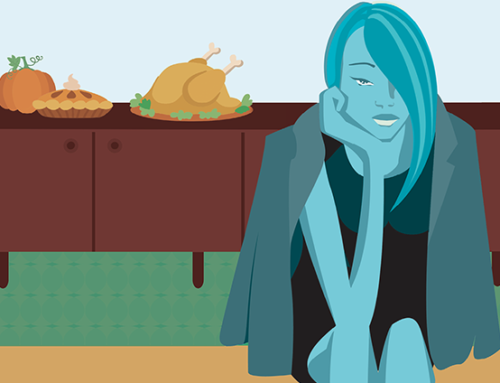When parents recognize that their teenager might be depressed, they are often desperate for help. They see their son or daughter struggling, and want to do everything in their power to help them feel better as soon as possible. (By the way, if you’re wondering if your teen might be depressed, click here to learn about the signs of depression in teens.)
Parents sometimes want to start their teen on anti-depressant medication right away. Unfortunately, anti-depressant medication is less effective for kids and teens than it is for adults. When it does help, it usually takes at least four to six weeks to really work. Parents may be disappointed to learn that medication is not the quick fix they were hoping for. Medication can be a valuable component of treatment for some teens, but it’s not going to “fix” their depression, and it’s not going to do it quickly.
Fortunately, there are many other things that parents can do to help! Here are nine alternative ways to help teenagers improve their mood and recover from depression.
1. Help your teen develop and maintain connections with friends. Usually, when someone is depressed, they feel very alone. They also tend to isolate themselves, which makes the loneliness even worse. Therefore, anything you can do to help them connect and engage with others can help improve their mood. However, this won’t work if you just force them to join activities they aren’t interested in and spend time with people who they don’t enjoy. Instead, help your teen connect with others who have similar interests and hobbies by helping them find clubs or activities in the community or at their school. Video game clubs, service clubs, and comic clubs all exist! Encourage them to invite friends over. Offer to pick up their friend if needed. Offer to drive them and a friend somewhere, such as to the movies or a mall.
2. Don’t forget to work on your own relationship with your teen! Depression often takes a toll on family relationships. Teen depression in particular can cause irritability and angry outbursts. Make it your goal to show your teen you care about them and love them no matter what. Your teen needs you to be as loving, caring, and supportive as possible right now, even though they can be tough to love. Try not to yell or lecture. Spend quality time with them as much as you can, and encourage others in the family to do the same. Don’t force them to talk to you, but be open and available when they want to talk.
3. Help your teen clean up their diet. When teens begin to eat healthier, it can have surprisingly large effects on their mood. Don’t worry – it doesn’t have to be perfect! Just try to help them incorporate healthier things into their daily routines. For example, you could incorporate more vegetables into meals. Give them a reusable water bottle (such as the one I have) to help them remember to drink water throughout the day. Buy fewer processed foods such as cookies and chips. Buy more healthy snacks such as nuts and fruits. Eat at home rather than going out to eat as much as possible. Limit sugar and unhealthy desserts in your home, but stock plenty of fresh fruits. Each of these is a step toward a healthier body and healthier mind, as is the next tip:
4. Encourage your teen to exercise. If they are already on a sports team or in marching band, great!
However, if they spend most of their free time sitting around, getting moving can go a long way in helping them feel better. It could be as simple as asking them to take a walk with you in the evenings after dinner. If you belong to a gym, encourage them to come with you. Or you may want to ask them if there’s a sport or activity they want to join. Swimming, karate, and dance are often popular ideas.
5. Yoga. This can be helpful even if your teen is already exercising in other ways. Practicing yoga regularly can literally alter the biochemistry of the body as well as improve the skill of mindfulness. These changes and skills can result in noticeable improvements in mood. Find some yoga videos on YouTube (such as this or this) or download a yoga app for your teen’s phone or tablet (such as this or this). Or you might ask your teen to join you in trying a yoga class at a gym or studio near you. Remember that if you are willing to join alongside them in trying these new things, they will be more likely to try it – and if you stick to it, they will be more likely to as well.
6. Make sure your teen is sleeping well. Teens need significantly more sleep than adults – usually at least 9-10 hours a night.Click here to read why sleep is so important for teens and ckick here to learn how to help your teen get more, and better, sleep.
7. Help your teen find a passion. Teens with depression often feel like life is meaningless. Having purpose and meaning in life can be a great way to help them recover. This isn’t something you can force them to do, of course, but you can help them. Have they always shown an interest in art? Buy them some art supplies and they might become passionate about painting. Are they interested in religion and spirituality? Take them to religious services and activities, as this can be a great way to find meaning in one’s life. Is there a cause or group of people they care about? Help them find a way to volunteer in these areas. Are they feeling lost about their future? Enroll them in a career workshop or help them explore their interests so that they have a clear direction of what their goals are and what they want to do in life.
8. Don’t be afraid to think outside the box! For example, let’s say right now your teen is spending most of their time in their room playing video games. Think about how you can build on this to help improve their mood. To help them develop friendships, encourage them to invite a friend over to play with them, or you could find a gaming club at their school or take them to a video game convention. To build your connection with them, sit down on the floor with them and learn about what they’re playing. Ask if you can join them. Don’t just do this once – regularly join your teen and show interest in the game they play. To incorporate exercise, offer to buy a game that will get them moving such as Wii Sports. It’s possible that you could even find ways to help incorporate this into future goals. For example, you might help them explore career options that utilize these skills, or enroll them in a class on game programming.
9. Finally, get them in therapy as soon as possible! Yes, I’m biased because I’m a psychologist, but this is a really important aspect of treatment for depression. Therapist can help your teen understand themselves better, learn new ways of thinking, and relate to others differently. If you don’t know where to go, ask around – chances are one of your friends has taken their child to a therapist they like. Word of mouth or a website like Psychology Today can help you find a therapist who is a good fit for your teen.
These will be helpful whether or not you choose to utilize anti-depressant medication for your teen. And the best part? These steps don’t have any side effects!




